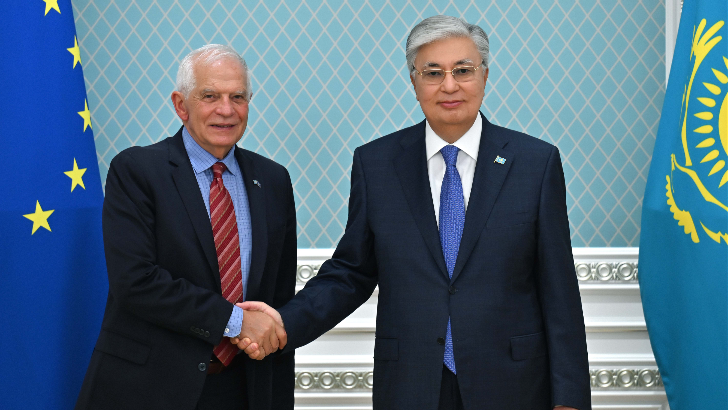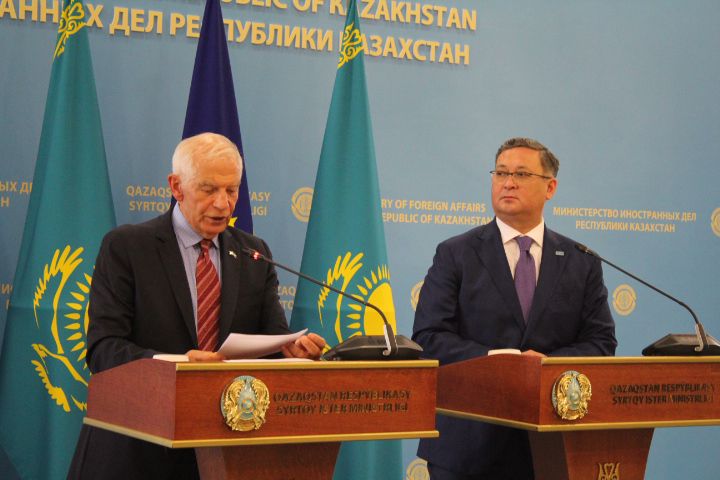ASTANA—The European Union (EU) is committed to maintaining the positive momentum in its relationship with Kazakhstan, said Josep Borrell, EU High Representative for Foreign Affairs and Security Policy and Vice President of the European Commission, at an Aug. 1 media briefing in Astana.

President Tokayev and Josep Borrell meet in Astana on Aug. 1. Photo credit: Akorda press service
Borrell is on an official visit to Kazakhstan on Aug. 1. This is his second visit to Kazakhstan. The first took place in November 2022.
While in Astana, he met with Kazakh Deputy Prime Minister—Foreign Minister Murat Nurtleu, discussing a wide range of issues pertaining to bilateral cooperation. He also met with President Kassym-Jomart Tokayev.

Josep Borrell and Murat Nurtleu at an Aug. 1 media briefing in Astana. Photo credit: Aida Dosbergenova/ The Astana Times
“My main message today is that we, the European Union, will remain committed to maintaining this positive momentum and continuing to strengthen our relations further with a more positive and continuous dynamic for the benefit of our people and the whole nations,” said Borrell.
Addressing journalists at a media briefing, Murat Nurtleu said the partnership between Kazakhstan and the EU is intensifying across many areas. According to him, in five months of 2024, trade turnover reached $20 billion, accounting for 37% of the country’s foreign trade. In 2023, the figure surpassed $41 billion.
“Last year, investments worth $10.4 billion were attracted from the EU countries to the economy of Kazakhstan. Since 2005, investments exceeded $180 billion,” said Nurtleu, who visited Brussels in May last year.
More than 3,000 companies with European capital operate across various sectors in Kazakhstan, including global giants such as Shell, Eni, Total, Amazonen-Werke, Air Liquide, Alstom and Carlsberg.
Traditional areas of cooperation are energy, transportation and logistics, agriculture, engineering and manufacturing, and information technology. “This time, we are focusing on developing cooperation on critical raw materials,” said the minister.
He noted regional and international issues were also on the meeting agenda. “In particular, we discussed challenges in Central Asia, including climate change in the region, the situation in Afghanistan and the Middle East. We stated the need to resolve conflicts taking place in the world exclusively on the principles of sovereignty, independence, and territorial integrity on the basis of the charter of the United Nations,” said Nurtleu.
Enduring commitment to developing ties
Thanking Kazakhstan for the hospitality, Borrell shared his vision of the bilateral ties between Kazakhstan and the EU.
“As my mandate representing the European Union will end in three months, it was important for me to come here to Astana to reaffirm our strong interest and commitment to strengthening this cooperation with Central Asia as a whole, and with Kazakhstan, the biggest country in the region, in particular,” said Borrell.
In January, the European Parliament passed a resolution on the EU strategy in Central Asia aimed at updating and revising its approach to the region. The document also adopted the joint roadmap for deepening ties between the EU and Central Asia.
Borrell highlighted the need to develop ties for the “common benefit of regional prosperity and international stability.”
“Kazakhstan has a strategic geographical position. It is a great bridge between Europe and Asia,” said the European diplomat, commending the country’s wide-ranging reforms.
“We support this path to modernization where economic and political reforms should go hand in hand. Promotion and protection of human rights and fundamental freedoms are key to an open, democratic, and inclusive society,” said Borrell.
In a time of high geopolitical instability, from the war in Ukraine to the escalating conflict in the Middle East, Borrell drew attention to what is happening in Gaza. He highlighted the growing risk of regional spillover.
“We have a shared interest in defending the United Nations Charter. We highly appreciate Kazakhstan’s principal support for this charter and your commitment to international law,” he said.
Dynamic development of bilateral ties
Borrell stressed the diversification of trade ties. According to him, nearly one-third of Kazakh exports go to the EU.
“We have to improve our business climate so that companies can fully take advantage of the new economic cooperation possibilities,” said Borrell.
The potential for cooperation in critical raw materials remains high. According to Borrell, Kazakhstan was the first country in the region to sign a memorandum of understanding in critical raw materials with the EU in November 2022.
“Critical raw materials will be something that will resonate in the future. Oil built civilization in which we are living and raw materials will build the following civilization. Diversification and resilience of our supply chains is something mutually beneficial,” said Borrell, welcoming Kazakhstan’s joining the EU’s Mineral Security Partnership Forum.
He underlined significant changes in the relationship between Kazakhstan and the EU in the past five years.
“When I started my mandate, the EU-Kazakhstan Enhanced Partnership and Cooperation Agreement had not yet fully entered into force. Now, almost five years later, its implementation is in full swing. It is clear that it is delivering benefits for businesses and citizens on both sides,” he said.
Kazakhstan so far remains the first and only country in Central Asia to have signed such an agreement with the EU.
Connectivity
Connectivity is an important aspect of the Kazakhstan-EU partnership and, as Borrell described it, an “area of mutual interest.”
The EU supported Kazakhstan in the development of the Trans-Caspian International Transport Route. In January, European and international financial institutions announced a 10 billion euros (US$10.8 billion) commitment to invest in the development of the corridor.
Recent months have seen tangible developments, including the launch of a coordination platform that will facilitate projects along TITR and connect all stakeholders in a broader effort to turn the corridor into a sustainable, competitive, and efficient route.
“Upcoming investments will enhance land connectivity by supporting the Trans-Caspian Transport Corridor. The horizontal aviation agreement, which is almost ready to be installed, will boost air connectivity between the EU and Kazakhstan. It will be easier for me to visit you and for you to visit me. There will be more facilities to come and to visit your beautiful country,” said Borrell.
People-to-people ties
Borrell also discussed developing people-to-people contacts. According to him, a record 160,000 visa applications were processed from Kazakhstan last year.
“All that shows how dynamic our relationship is. These are good and concrete examples of mutual benefits of our growing bilateral cooperation,” he said.
The EU and Kazakhstan are currently discussing visa facilitation. The first step in this process was laid out during the visit of Murat Nurleu to Brussels in May 2023, when he met with Ylva Johansson, European Commissioner for Home Affairs.
